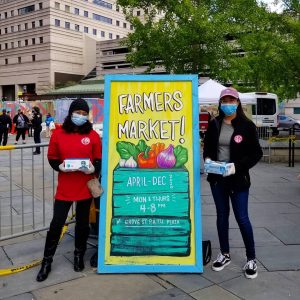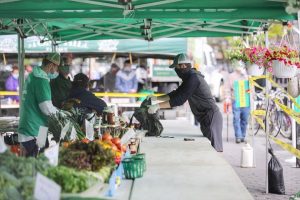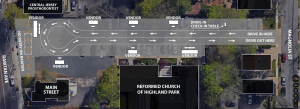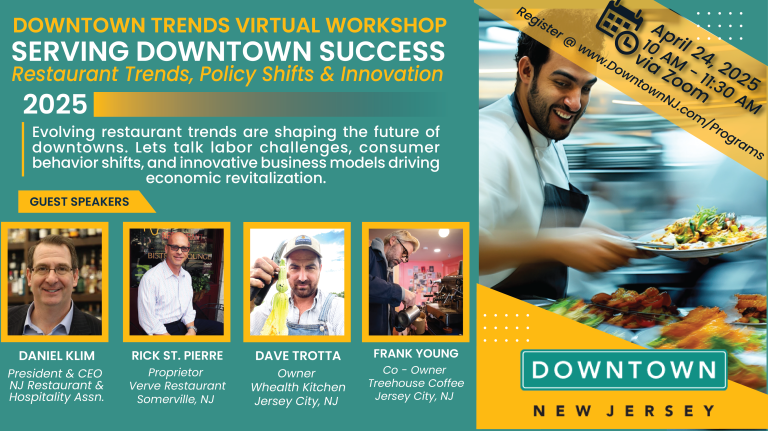Downtown Management Forum: Farmers Markets in the New Normal
Courtenay D. Mercer, PP, AICP
Executive Director, Downtown New Jersey
Rachael Thompson Panik
Associate Planner, Mercer Planning Associates
May 13, 2020
Downtown New Jersey provided a series of virtual opportunities for downtown managers, economic development professionals, and public officials to exchange ideas about best practices related to downtown economic development in light of the COVID-19 crisis.
As downtowns continue to adapt to changing regulations and consumer preferences during the COVID-19 pandemic, farmers markets present particular challenges. Typically crowded and bustling, community leaders are now tasked with organizing markets that are safe for shoppers while still providing fresh food options for people who need it most. Rachel Sieg, the Executive Director for the Historic Downtown Special Improvement District (HDSID) in Jersey City, and Rebecca Hersh, Executive Director for Main Streets Highland Park, shared their experience opening farmers markets in their respective downtowns.
Watch Video:
Downtown Jersey City Farmers Market

Photo: Jen Brown

Photo: Jen Brown
Main Street Highland Park Market
The Main Street Highland Park Farmers Market had planned on hosting a strictly monitored farmers market that would limit shopper density and create set walking routes for customers. They changed plans, however, in response to requirements from local police and the County Emergency Management Department and transitioned into a drive-through only farmers market. The drive through route allows customers to enter and exit from a single check-in point to pick up pre-ordered groceries in a completely cashless system. Like the Jersey City market, most of their vendors did not have online ordering in place. Some were able to pivot on their own to add online sales. To help other vendors adjust Main Street Highland Park sponsored platforms for online sales through Local Line. During the first weeks, the Main Street highland Park had six vendors. They plan to expand to have eight this coming week, and more in future weeks. Shoppers placed around 80 orders. While the market was strictly advertised as a drive-through market only, they still had some customers walk into the market to collect their orders, and they were not turned away. Past markets used both food pantry vouchers and St Peter’s Hospital vouchers for those who qualified for them, allowing vulnerable people to have access to fresh food. Right now, Main Street Highland Park is considering taking phone orders themselves and having them drop the vouchers at their office.
During the first weeks, the Main Street highland Park had six vendors. They plan to expand to have eight this coming week, and more in future weeks. Shoppers placed around 80 orders. While the market was strictly advertised as a drive-through market only, they still had some customers walk into the market to collect their orders, and they were not turned away. Past markets used both food pantry vouchers and St Peter’s Hospital vouchers for those who qualified for them, allowing vulnerable people to have access to fresh food. Right now, Main Street Highland Park is considering taking phone orders themselves and having them drop the vouchers at their office.Discussion and Q&A
- In some places, it may be challenging to host a market in locations where it is not as open or easily transformed into a drive-through market. In Trenton, for example, their farmers market is typically in a park, which means that it cannot easily be set up for car traffic.
- Markets often make use of paper vouchers as a part of their sales or benefits for qualifying customers. One option to continue to use vouchers safely is to have a drop box for them, and then have staff count them after, which limits the number of people touching the vouchers and protects vendors from additional contact.
- Some markets in New Jersey partner with farmers to accept SNAP benefits, but it is not clear what that process will look like in a limited or contact free environment. This will present challenges moving forward. In Jersey City, the farmers handle processing SNAP and are still accepting it now.
- Some organizers have been asked by local officials to pay extra for police enforcement at their farmers market. Both Rachel and Rebecca shared that they had enough support and enforcement through staff and volunteers without additional support from police officers. They have also made use of intentionally placed signage and cones to direct people where they need to go.
- Forum participants shared resources that can help downtown leaders host safe markets during the pandemic:
- Maintaining Social Distancing and Safe Food Handling Practices: Guidance for Farm Markets from Rutgers Cooperative Extension. This document provides direction for community farmers markets and on-farm retail outlets to protect the well-being of staff and customers.
- The following websites have free options for signage:

